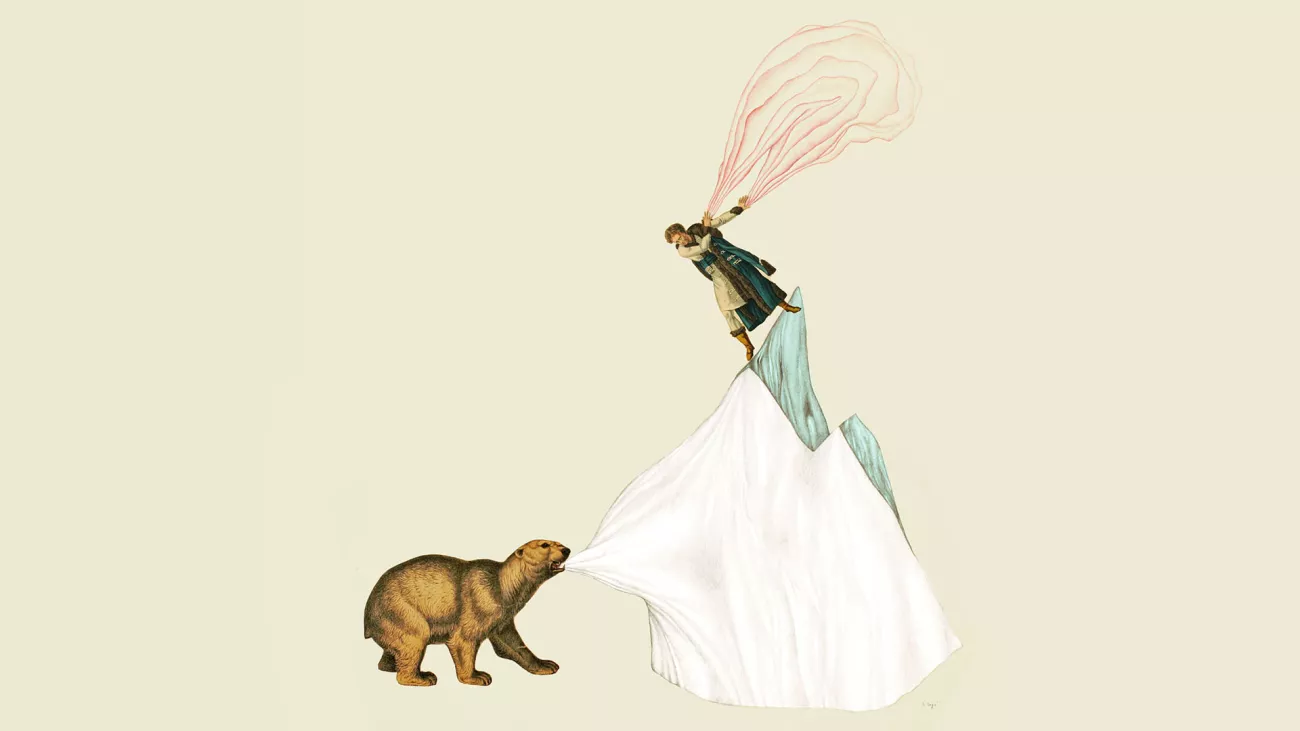Dramatic poem by Lord Byron, with music. In the grip of his demons, proud Manfred revels in his suffering while calling for forgetfulness of his sins. Presentation of the work by Agnès Terrier 40 minutes prior to each performance.

For the Romantic generation, poetry was embodied by Lord Byron whose life was part and parcel of his œuvre. At the end of a career haunted by opera, Robert Schumann tackled Manfred during his last creative period, giving free rein to his fascination with depths six years prior to his confinement. In the grip of his demons, proud Manfred revels in his suffering while calling for forgetfulness of his sins.
Contemporaneous with the opera Genoveva, the score rejects scenic pragmatism so as to better explore the possibilities of musical expression combined with declamation: akin to Berlioz’s Lélio, it is deemed unperformable. Schumann accepted its premiere to be conducted and directed by Franz Liszt in Weimar but could not attend it, overwhelmed by his own hallucinations. In 1979 Carmelo Bene wrote a stage adaptation at the Scala in Milan. Georges Lavaudant and Emmanuel Krivine use this version and invite us to plunge into the torments of the Romantic soul.
Performed in German and French with supertitles
Performance duration : 1h30, no intermission
France Musique will broadcast Manfred on the 26th december 2013.
PART ONE
At his castle in the Higher Alps, Lord Manfred, who relinquished all life possessions, cannot manage to die.
Overture
The power of his mind enables him to call forth the spirits of the universe. Haunted by the persistent thought of his curse, he asks them to give him self-forgetfulness.
N° 1. The spirits of air, water, earth and fire can give him everything except that. And death will not give him oblivion. Manfred asks them to appear under the form of their choice.
N° 2. When the spirit of air app ears in the shape of a beautiful woman, he collapses.
N° 3. A fourfold bass voice and a spirit tell him that he is doomed to be his own hell. The following day at dawn, Manfred climbs up the Jungfrau Mountain.
N° 4. The flight of the eagle and the shepherd’s pipe only emphasize the vanity of existence, yet nature denies him death. On the verge of plunging into the abyss, a chamois hunter grasps him.
N° 5. Symphonic entr’acte.
PART TWO
In the hunter’s chalet, Manfred rejects his aid, convinced that he is doomed to suffer eternally for a sin he cannot reveal. He shuns the simple kindness of his host and makes for the mountain.
N° 6. By a waterfall, Manfred calls forth the Fairy of the Alps to contemplate her and forget himself in the mysteries of nature which have always consoled him for human mediocrity. He eventually confesses to the fairy what tortures him: the love he once felt for the woman who must have been his own sister and whose heart he broke. Nothing has soothed his pain, neither madness nor death.
Yet, when the fairy offers to help him in return for his obedience, Manfred refuses categorically.
On the contrary, he decides to make the Dead One appear.
N° 7. On his throne of fire, Arimanes, Prince of Earth and Air, keeper of life and death, is celebrated by the Spirits who watch all kinds of agonies rain on men.
Nos 8 and 9. Manfred bursts in and refuses to bow down. Despite the affront, the First Destiny defends him since his will and sufferings made him an uncommon being.
N° 10. Manfred is offered the possibility to summon Astarte by Nemesis herself.
N° 11. He entreats the departed one to say a word of forgiveness or condemnation. As written by Byron, she utters but two words: “Manfred” and “Farewell.”
PART THREE
N° 12. Back in his castle, Manfred has arranged everything for the death as promised by Astarte. He receives the abbot of St Maurice who reproaches him, besides his solitude, his acquaintance with the spirits of death, and offers him to reconcile himself with the Church. Manfred does not want a man to be the mediator between Heaven and himself. He wants to remain free till the end. Although the abbot promises him absolution, Manfred has given up all hope that would bind him to mankind.
N° 13. Manfred bids farewell to the sun.
N° 14. The clergyman attends the appearance of Manfred’s spirit, followed by infernal spirits who have come for the condemned one. But Manfred refuses to submit, refuses even hell for he already bears it inside him. He assumes his sin and wants to be his own torturer.
N° 15. Added to Byron’s text by Schumann, a religious choir accompanies the death of Manfred who remains inflexible.
Not as famous as the figures of Don Juan and Faust, Manfred, who came to life and died with Romanticism, had great resonance in the arts of the 19th century.
Its author, more identifiable than these other two modern myths, was renowned in his lifetime for portraying himself in his works. Lord Byron was 29 when Manfred came out in 1817. In the Europe of culture, his nefarious reputation threatened the fame of his poetry. His young wife had just left him with suspicions of domestic violence, acts of madness and incestuous practices.
Exiled in Switzerland, Byron was followed by admirers and lovelorn women. He found solace in the spectacle of nature and his conversations with two other writers at odds with society: the poet Percy Shelley and his future wife Mary Godwin. On Byron’s suggestion, she conceived a literary character that was to fascinate the 20th century: Frankenstein, or The Modern Prometheus. Imagined during that very summer of 1816 in the same mountains of the Bernese Highlands, is Manfred – the Promethean figure who faces divine power – the brother of Doctor Frankenstein, who like him can control nature, or the brother of his monstrous creature with whom he shares misanthropy and solitude?
Heralding the famous Wanderer above the Sea of Fog painted by Caspar Friedrich the following year, Manfred gave the Romantic soul its poetic voice. Although the influence of Shakespeare and Goethe can be felt, Manfred struggles primarily against himself, which makes the drama unfit for the stage. Besides, Byron wrote his dramatic poem “with a genuine horror of drama and intended to make it unperformable.” Its form, put into verse, avoids the current literary genres with its three acts unfolding in eight different places and its absence of action in favor of radical words uttered by invisible speakers, imaginary creatures and allegories. The work was soon translated into French – the cultural language of Europe – by Amédée Pichot. It instantly bewitched poets such as the 27-year-old Lamartine and the very young Victor Hugo aged 15, to mention but French authors.
In 1824 the premature death of Byron while fighting with the Greeks against the Turkish domination made the traveling and committed poet a supranational hero. His works enabled artists from various disciplines to express their views on the place of modern man in the world and inspired generations of painters – including Toulouse-Lautrec, Delacroix, Turner – and musicians such as Hector Berlioz in 1834 with his symphony Harold en Italie.
The first composer to pick out Manfred was Robert Schumann, who was 14 when the poet died. Anglophile like many others of his generation, he likes Byron all the more so as his father, so decisive in the awakening of his calling and who dies a few months later, translated several of the poet’s works. Manfred has been his bedside book since adolescence when Schumann decides at 38, overcoming the failure of his sole opera Genoveva, to compose a drama of the imagination from the poem in the image of Lelio (1832) by Berlioz, whose common friend, Franz Liszt, is to commission a revised version for his theater in Weimar (1855). In the middle of that century, the three share the same ambition: develop an expressive instrumental music that can rival the poetic voice.
Manfred, Schumann’s Opus 115, is mainly written in 1848 during a period of serious depression, yet in full possession of his creative powers. “I have never devoted myself to a composition with so much love, never have I spent so much strength than for Manfred,” he says to his friend Wasielewski, interrupting his Scenes from Goethe’s Faust for it.
The hero’s guilt toward his sister Astarte, inspired by Byron’s love for his half-sister Augusta Leigh, enabled the musician to express his own anxieties and regrets about his sister or perhaps his mother, more probably Clara, his young wife whose genius was stifled. Clara Schumann wrote in her diary: “The melody of Manfred, concealed in my heart, often haunts me, more than any other melody!” Manfred’s determination to die consumed with his thought, like Byron with his work, also sustains the composer who is increasingly in touch with his inner voices.
Schumann works from an 1839 translation by Carl Adolf Suckow. He takes away two third of the lines (975 out of 1336), inverts or concentrates some scenes, recombines certain vocal parts, adds a final chorus, while preserving the integrity of the lines and the subject as a whole. As a real appropriation, he thinks that his reworking should favor a new, non-operatic form of stage representation.
Simply called “dramatic poem in three parts” (Dramatisches Gedicht in Drei Abteilungen), Manfred involves a narrator (Manfred), spoken solos, a choir for different collective roles and an orchestra. Its sixteen musical numbers include an extended overture that works like a digest of the piece, a symphonic entr’acte, arias, choruses and passages of sheer declamation interspersed with several melodramas of various lengths.
Very pleased with his Manfred, Schumann conducts the premiere of the overture in Leipzig on 14 February 1852 at a festival devoted to his oeuvre. The premiere of the complete stage version is conducted by Liszt a few months later, on 13 June 1852, at his theater in Weimar. The score, the manuscript of which is given to him, must seal their friendship. Although Schumann sees to the production from afar, having the libretto printed for the public and insisting to “make the actor from Weimar understand the meaning of his high task,” he does not attend the premiere, struck by his depression during the journey with Clara.
In France, the work is premiered in a French translation by Victor Wilder under the baton of Emile Moreau at the Concerts Colonne on 13 March 1886. The title role is acted by the great Mounet-Sully of the Comédie-Française who performs it regularly until 1909. Even though Manfred is an exception in Western operatic production, its influence, akin to that of Berlioz, can however be felt in a few works such as Guercoeur by Albéric Magnard, completed in 1900.
Manfred is performed for the first time at the Opéra Comique in 2013. Emmanuel Krivine conducts the score’s complete version and Georges Lavaudant’s directing is based on the choice of Carmelo Bene at La Scala in 1978. A single actor plays the title role and the secondary figures, taking up Schumann’s challenge to create a drama of the soul.
Music direction, Emmanuel Krivine • Statging and lighting, Georges Lavaudant • With Pascal Rénéric, Astrid Bas
Anneke Luyten, Sarah Jouffroy, Norman Patzke, Luc Bertin Hugault, Geoffroy Buffière, Olivier Dumait, Cyrille Gautreau • Orchestra, La Chambre Philharmonique • Chamber choir, les éléments
Monday, December 9, 2013 - 8:00pm
Wednesday, December 11, 2013 - 8:00pm
Thursday, December 12, 2013 - 8:00pm
Saturday, December 14, 2013 - 8:00pm
Sunday, December 15, 2013 - 3:00pm
1:20 - Salle Favart
110, 87, 67, 41, 15, 6 €
Cast













Génies et Esprits, Anneke Luyten, Sarah Jouffroy, Olivier Dumait, Norman Patzke, Luc Bertin Hugault, Geoffroy Buffière, Cyrille Gautreau
Choir, les éléments
Orchestra, La Chambre Philharmonique
Production, Opéra Comique
Partnership




















